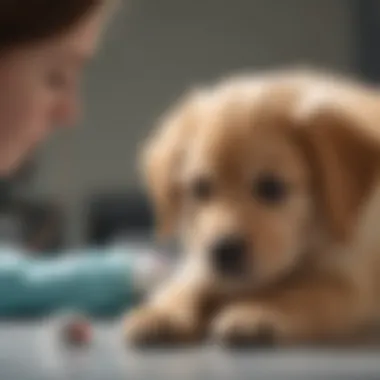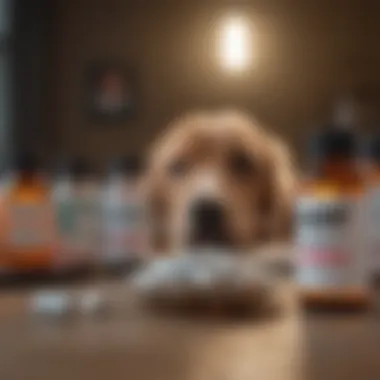Essential Giardia Treatment Options for Puppies


Intro
Giardia is a word that might send shivers down the spine of any puppy owner. This single-celled parasite can cause gastrointestinal havoc in our four-legged friends, leading to symptoms like diarrhea, vomiting, and lethargy. As loving pet parents, understanding giardia and how to manage its impact on our puppies is crucial. This guide digs deep into the world of giardia infections, exploring the medications available and the care simply can't be overlooked during recovery.
Pet Care Essentials
Taking care of a puppy comes with a laundry list of responsibilities that include more than just treating illnesses. While giardia represents a significant health concern, nurturing the overall well-being of your puppy entails daily attention to various aspects of its life.
Daily Nutrition Requirements
A well-balanced diet plays a huge part in maintaining a puppy's health and fortifying its immune system against infections like giardia. Young pups need nutritious, high-quality puppy food that is specifically formulated for their growth stage. It's imperative that you incorporate:
- Proteins such as chicken, fish, or lamb to support muscle growth.
- Complex carbohydrates found in brown rice or sweet potatoes for sustained energy.
- Fruits and vegetables packed with vitamins and minerals.
Keeping your puppy hydrated is equally important. Fresh, clean water should always be accessible to help flush out toxins from its system.
Exercise and Playtime
Regular exercise isn’t just play; it's essential for maintaining your puppy's physical health and mental stimulation. Taking puppy for daily walks or engaging in interactive playtime helps manage their energy levels, reducing stress that could potentially weaken their immune response against giardia.
Grooming Tips
Grooming goes beyond making your puppy look cute; it also promotes skin health. Regular brushing keeps their coat free of debris and mats, while also checking for any signs of gastrointestinal discomfort, such as bloating. Not to mention, grooming provides a great opportunity to bond and teach your puppy to be comfortable with personal care.
Health and Wellness Check-ins
Routine visits to the veterinarian are non-negotiable. Keeping up to date with vaccinations and just a general health check can preempt many issues, including a giardia infection. Regular fecal exams can help catch such parasites early, saving your puppy from severe symptoms later on.
Behavior & Training
Training and behavior management are integral to a puppy's development. As caring pet owners, monitoring behavioral changes during an illness like giardia is essential. Your puppy can’t tell you they aren’t feeling well, but their actions might speak volumes.
Understanding Your Pet's Body Language
Puppies communicate through body language. Pay attention to any shifts in behavior such as:
- Loss of appetite
- Whining or yipping
- Excessive sleeping or lethargy
Recognizing these signals can alert you when your puppy isn’t feeling its best, warranting further attention.
Basic Training Techniques
Training should be consistent and fair. Incorporate positive reinforcement methods, which not only aid in basic commands but also build your puppy’s confidence. Practices like sit, stay, and come contribute to a safer environment, especially when dealing with potential illness, like ensuring your dog isn't wandering in areas that may be unsafe or unsanitary.
Behavioral Concerns & Solutions
If a puppy appears to be unusually anxious or withdrawn, consider these simple strategies:
- Increase gentle, calm interaction
- Use soothing environments
- Regular routines can provide comfort
Socialization Tips
Getting your puppy used to various environments, people, and animals lowers stress levels and aids in general well-being. However, when there's an active giardia issue, it may be prudent to limit exposure to potential germs in public settings.
Pet Home Environment
Providing a conducive living space for your puppy is fundamental. The environment should support not just well-being but also recovery.
Creating a Pet-friendly Space
Dedicating a zone where your puppy feels comfortable is essential. A comfy blanket and a few familiar toys can minimize stress. Whether they’re recovering from an illness or just need to unwind, a designated safe space can do wonders.
Safety Measures and Hazards to Avoid
Keep cleaning supplies, chemicals, and small choking hazards out of reach. Puppies are naturally curious and can easily get into trouble, especially when they’re not feeling their best.
Choosing the Right Toys and Accessories
Opt for durable toys rather than delicate ones. Toys that can’t be easily destroyed can prevent accidental ingestion of harmful materials, which is vital during recovery.


Setting Up a Comfortable Resting Area
A cozy resting area goes a long way, especially when your puppy is ill. It's just like us needing a warm bed when we’re under the weather. A calming space where they can curl up is necessary, aiding in rest and recovery.
Pet Health Issues
Puppies are prone to various health issues, making it vital to remain vigilant about any changes.
Recognizing Signs of Illness
Spotting the initial signs of giardia early on can make a difference. Watch out for:
- Sudden changes in appetite
- Watery diarrhea or unusual stool consistency
- Signs of dehydration
Preventative Care Measures
Routine preventive care is key. Keeping your puppy's surroundings clean, opting for high-quality food, and avoiding stagnant water can help reduce the risk of giardia infection.
Common Ailments and Treatments
Giardia isn't the only concern for a puppy. Other common ailments include parvovirus, distemper, and kennel cough. Always consult your veterinarian before starting any medication or treatment plans.
Emergency Preparedness
Being prepared allows for quicker responses to unexpected health issues. Develop a plan for emergencies, including knowing the closest veterinary clinics and having a first aid kit on hand.
"An ounce of prevention is worth a pound of cure." - Benjamin Franklin
Understanding giardia and its effects on puppies is more than just knowing about the medications; it's about grasping the full picture of your puppy's health and well-being. The road may seem complicated, but navigating through it with informed decisions can ensure a happier, healthier life for your adventurous companion.
Understanding Giardia Infections in Puppies
Giardia is an issue that many puppy owners might not immediately consider, but it's crucial to grasp the ins and outs of this illness as a part of your puppy's overall health. Understanding Giardia infections in puppies isn't just about knowing how to treat it; it's also about being proactive to protect your furry friend. With the right insight, pet owners can minimize the risk of infections before they even arise.
Overview of Giardia
Giardia is a microscopic parasite, specifically a protozoan, that can wreak havoc within a dog's digestive system, causing gastrointestinal distress. These little critters often hang out in contaminated water or food, making the prevention of Giardia infections all the more important. The parasite is resilient, with cysts able to survive outside a host for prolonged periods, which complicates control measures. Recognizing this, it's essential for owners to be aware of the environment where their puppies play or explore.
Transmission Pathways
Giardia commonly spreads through the ingestion of contaminated materials. Here are the basic pathways to be mindful of:
- Contaminated Water: Puppies are known to take a drink from puddles or ponds, sometimes without a second thought. If that water contains Giardia cysts, they can become infected almost instantly.
- Infected Animals: Interactions with other dogs or animals that carry the parasite can lead to transmission through direct contact or shared feces. Puppies, being social and curious creatures, are more likely than not to explore and sniff around.
- Infected Surfaces: Even seemingly clean areas, such as yards or parks, may harbor Giardia cysts if other animals have left their mark. It’s a good idea to monitor these spaces and clean them regularly, especially if you know other canine friends frequent the same spots.
Common Symptoms
Spotting Giardia in a puppy is not always straightforward. Some might not show symptoms right away, while others can manifest issues quite rapidly. Here's what to keep an eye on:
- Diarrhea: This is the most common symptom. You might notice that your puppy has loose stools or watery diarrhea, sometimes with a foul odor.
- Vomiting: Some pups may also experience vomiting, which can lead to further dehydration if not addressed immediately.
- Lethargy: If your once lively puppy seems to be dragging its paws, it might be struggling with a Giardia infection.
- Weight Loss: Prolonged illness could result in noticeable weight loss, suggesting that your puppy isn’t absorbing nutrients effectively.
- Dehydration: Watch for signs of dehydration, like dry gums or excessive thirst, as this can escalate rapidly in young puppies.
A quick response to gastrointestinal symptoms can make all the difference in your puppy's recovery. Acting fast is crucial for preventing severe complications.
Being familiar with these symptoms can help owners intervene sooner, making recovery smoother for their puppies. With an understanding of Giardia's nature, the transmission methods, and its symptoms, puppy owners can take essential steps to protect their pets, keeping Giardia infections at bay.
Diagnosis of Giardia in Puppies
Diagnosing Giardia infections in puppies is a critical component of ensuring their health and well-being. Early and accurate diagnosis not only assists in implementing effective treatment plans but also minimizes discomfort for the puppy. Recognizing the signs early can make a significant difference in recovery time and reduce the risk of complications. Moreover, understanding the diagnosis process can empower pet owners with the knowledge they need to take proactive measures in their pet’s health journey.
Veterinary Examination
The first step towards diagnosing Giardia in has to do with a comprehensive veterinary examination. During this initial visit, the vet will assess the puppy’s overall health while also being on the lookout for specific signs of infection. Typical indications may include symptoms such as diarrhea, weight loss, and a dull coat, all of which are key red flags.
It’s important for pet owners to provide a thorough history of the puppy’s condition. Any recent changes in behavior, eating habits, or exposure to other pets can be significant.
Key aspects of the examination include:
- Observation of Symptoms: The vet will investigate the puppy's gastrointestinal health and might inquire about the consistency and frequency of poop.
- Physical Examination: A thorough physical exam checks for signs of dehydration or abdominal discomfort, which can occur when Giardia is present.
- History Gathering: The veterinarian will ask detailed questions about the puppy's environment, such as if it has had contact with contaminated water sources or feces.
This examination serves as a fundamental building block for moving into more specific diagnostic tests.


Diagnostic Tests
Once the veterinarian suspects a Giardia infection, they will likely recommend a series of diagnostic tests to confirm the presence of the parasite. These tests aid in pinpointing the specific type of infection, allowing for tailored treatments.
There are a few common tests used for diagnosing Giardia, which include:
- Fecal Examination: This is the most common test. The vet collects a stool sample and examines it for Giardia cysts under a microscope. A single negative test does not completely rule out infection, so sometimes, multiple samples over a few days may be necessary.
- ELISA Test: An enzyme-linked immunosorbent assay can detect Giardia antigens in the feces. This test is known for its accuracy and speed but may be higher in cost.
- PCR Testing: For more complicated cases, polymerase chain reaction testing allows for the detection of Giardia DNA in the fecal matter. This method is quite sensitive and can identify infections even in low quantities.
Important Point: Remember, diagnosing Giardia is not just about confirming the infection but also about understanding the best course of action for treatment and preventing further spread.
Giardia Medication Options
When dealing with giardia infections in puppies, understanding the medication options is paramount. This section sheds light on why selecting the right treatment is crucial for restoring your pup's health and well-being. Giardia can lead to severe gastrointestinal issues if not handled properly, making timely and effective intervention critical. Knowing what medications are available, how they work, and their respective benefits enables pet owners to make informed choices. It goes beyond just the prescription; it’s about ensuring a comprehensive approach to treatment that blends the right medication with proper post-treatment care.
Overview of Treatment Types
There are a few treatment pathways for giardia that pet owners can consider. These generally can be categorized into antimicrobial therapy and supportive care.
- Antimicrobial Therapy: This is the primary mode of action against giardia. Medications in this category kill or inhibit the growth of the parasite, addressing the root of the problem. Popular choices include drugs like metronidazole, fenbendazole, and albendazole.
- Supportive Care: This involves measures taken alongside medication to help the puppy recover. Hydration, proper nutrition, and monitoring the puppy’s general health are critical. Maintaining a nourishing diet can help a puppy regain strength and vitality during treatment.
Common Medications Used
Metronidazole
Metronidazole is widely regarded as a go-to medication for giardia in puppies. Its primary action is to disrupt the DNA of the giardia, inhibiting their ability to reproduce. A standout feature of metronidazole is its efficacy, which has earned it a reputation among veterinarians as a reliable choice for many infections, not just giardia. However, it comes with potential side effects, including nausea or dizziness, which, while generally mild, can be distressing for our furry companions. Knowing that metronidazole is often used in combination with other medications amplifies its effectiveness in treating giardia.
Fenbendazole
Fenbendazole operates with a unique mechanism that prevents the giardia from absorbing glucose, ultimately starving the parasite. This makes it a prominent player in the treatment lineup. What sets fenbendazole apart is its favorable safety profile. It is regarded as a gentle option, allowing many puppies to tolerate it well. However, it might take a tad longer to show results compared to metronidazole, which might be a consideration for those who want quicker relief.
Albendazole
Albendazole is another alternative to consider. It works by inhibiting the polymerization of tubulin, which the giardia need for metabolic processes. One of its distinguishing characteristics is its broader spectrum of action; it targets several types of parasites, not just giardia. Though quite effective, albendazole can come with a stronger side effect profile and is less commonly used than the previously mentioned medications.
Dosage and Administration
The correct dosage and method of administration can be crucial in ensuring effectiveness. Each medication has its specific guidelines, typically dictated by the puppy’s weight and health status. It’s essential to follow the veterinarian's recommendations carefully to avoid underdosing or overdosing. Medications may come in various forms, like tablets or liquid solutions, making it necessary to tailor the administration method to the puppy’s preferences and tolerances.
Remember that maintaining a routine is vital. For instance, try to give the medication at the same time every day, which can aid in establishing a pattern and improving compliance from your puppy.
Important Note: Always consult your veterinarian before starting any treatment. What works for one puppy may not be suitable for another due to unique health factors.
Managing Side Effects of Giardia Medication
Managing side effects of giardia medication is vital for ensuring your puppy’s comfort and health during treatment. Although these medications are usually effective, it’s not uncommon for some puppies to experience reactions to them. Thus, being informed and observant can significantly make a difference in the recovery process.
By understanding potential side effects, pet owners can act promptly and effectively if those side effects occur. This section dives into the specifics of identifying adverse reactions and knowing when to reach out to a veterinarian.
Identifying Potential Reactions
Adverse reactions to giardia medications can manifest in various ways. It's important to keep a close eye on your puppy post-medication. These reactions might include:
- Gastrointestinal issues such as vomiting, diarrhea, or loss of appetite. This could be the body's response to the medication, as some puppies might react negatively to the chemical composition.
- Behavioral changes like lethargy or agitation. If your puppy seems more tired than usual or overly restless, it could indicate discomfort.
- Allergic reactions, which may result in symptoms such as itching, swelling (particularly around the face), or hives. Be cautious, as these symptoms can escalate quickly.
Keeping a journal of your puppy’s changes can be useful. Document what medication was given, the dosage, and any symptoms observed. This can help both you and your veterinarian determine what’s happening and how best to address it.
"A watchful eye can mean the difference between a small concern and a serious health issue."
When to Contact a Veterinarian
It's common for pet owners to feel anxious about their puppy’s health during treatment. Not every side effect warrants immediate veterinary attention—but knowing when to make that call is crucial. Here are some guidelines to consider:
- Persistent Vomiting or Diarrhea: If your puppy is throwing up or having diarrhea multiple times over a day, it's time to pick up the phone. Dehydration can set in quickly, putting your puppy's health at risk.
- Loss of Appetite: A day or two of not eating can be okay, but if it extends beyond that, especially if paired with other symptoms, consult your veterinarian.
- Swelling or Difficulty Breathing: If you notice swelling around the face or any difficulty in breathing, seek immediate veterinary help. These are signs of a potential allergic reaction.
- Severe Lethargy: If your puppy is unusually lethargic and not responding to your attempts to engage them, this is a serious cue that you should get in touch with your vet.
Being proactive rather than reactive can save your puppy from a more significant health scare. Don't hesitate to seek professional advice if you're uncertain about any symptoms your puppy displays during or after treatment. Your intuition as a pet owner is invaluable.
Post-Treatment Care for Puppies
After a bout with giardia, ensuring that your puppy receives proper post-treatment care is vital. This phase doesn’t merely encompass the cessation of medication; it involves a comprehensive approach aimed at fostering the health and well-being of your recovering pet. Throughout this segment, we will explore monitoring strategies and nutritional needs that significantly enhance the recovery process.


Monitoring Recovery
Keeping a vigilant eye on your puppy during the recovery phase is essential. It's not enough to just follow the vet's prescription; you want to ensure that your furry friend bounces back to their playful self. Here are some factors to consider while monitoring your puppy's recovery:
- Behavioral Changes: Observe if your pup shows signs of lethargy or disinterest in their usual activities. A sudden increase in energy or an unusual amount of hyperactivity can also signal that something's not quite right.
- Stool Quality: Post-treatment, a puppy's stool should gradually return to normal. Diarrhea, especially if it persists beyond a week after treatment, may call for a return visit to the vet.
- Appetite: Notice any changes in how much and what types of food your puppy prefers to eat. A balanced appetite is often a strong indicator of recovering health.
Pro tip: Try to maintain a consistent feeding schedule to help regulate their digestive system.
Nutritional Considerations
The type of food that your puppy consumes can play a pivotal role in optimizing their health post-treatment. After dealing with giardia, their digestive system may be sensitive, and to aid recovery, consider the following:
- High-Quality Diet: Select dog foods that are rich in digestible proteins and low in fillers. Ingredients like chicken or fish should be prioritized, as these are generally easier on a recovering stomach.
- Probiotics: Introducing probiotics can be beneficial. These good bacteria help replenish the gut flora possibly diminished by giardia. You might consult your vet about probiotic supplements desired for your puppy.
- Hydration: Ensuring your puppy stays properly hydrated is crucial, particularly if their stools have previously been loose. Fresh, clean water should always be accessible.
Preventing Giardia Infections
Preventing giardia infections in puppies is crucial for ensuring their overall health and well-being. Giardia, a microscopic parasite, can lead to significant gastrointestinal issues in our furry friends. Taking proactive measures means fewer health complications and reduced likelihood of these infections spreading. With proper strategies, pet owners can help safeguard their pups from this pesky parasite.
Hygiene Practices
Keeping your puppy’s environment clean is fundamental. Regularly cleaning their living spaces can drastically reduce the risk of giardia. Make it a habit to wash their bedding at high temperatures, and make sure to clean food and water dishes daily. If your pup has had a bout of giardia, use a disinfectant that effectively kills the parasite on surfaces.
These simple practices can make a world of difference. Remember, a clean space ensures a healthy pup.
- Pick up waste promptly: Use a bag to pick up poop outside as soon as you can. This prevents the spread of the parasite in the yard and on walks in the neighborhood.
- Intensive cleaning: If your puppy has had giardia, consider steam-cleaning carpets and any area where they frequently play. Giardia can survive for long periods in the environment, so an extra layer of cleaning helps.
Safe Drinking Water
Access to clean drinking water is vital. Giardia can often be found in contaminated water sources, including ponds, lakes, or even puddles. Always provide your puppy with fresh, filtered water. At home, ensure their bowl is cleaned regularly to prevent grime build-up, which can harbor different bacteria and parasites.
"Prevention is better than cure". Providing safe drinking water is one of the most straightforward ways to ensure that your puppy stays healthy and free from giardia and other parasites.
Regular Vet Checkups
Regular checkups with a veterinarian can also play a significant role in prevention. During these visits, the vet can check for any signs of giardia or other health issues that might otherwise go unnoticed. It’s advisable to have stool samples analyzed, particularly if your puppy has had exposure to areas where other dogs have been.
- Vaccinations and Deworming: Keeping your puppy up-to-date on vaccinations and deworming schedules is essential. Even though there is no vaccine specifically for giardia, overall health management can help prevent parasitic infections.
- Health Monitoring: Watch for signs of illness, like lethargy or changes in stool. Early detection can make treatment easier if giardia appears.
By implementing good hygiene practices, ensuring access to safe water, and attending regular vet checkups, pet owners can significantly reduce the risk of giardia infections in their puppies. A healthy puppy means a happy owner!
Community and Support Resources
Connecting with Other Pet Owners
The journey of dealing with giardia in puppies can feel like an uphill climb, especially for first-timers. One of the best sources of support often comes from fellow pet owners who are navigating the same challenges. Online forums and local community groups offer a platform to share experiences, tips, and encouragement. These interactions can bring a wealth of knowledge that textbooks often overlook. You might find stories of similar situations or advice that has proven effective, from dietary changes to practical management tips.
Additionally, communities on platforms such as Reddit or specific Facebook groups can serve as virtual support networks. There, you can ask questions, share concerns, or simply vent about your frustrations. Real-time experiences from others can provide reassurance that you’re not alone in this battle against a common parasite.
The connection made through these channels can also help you feel more empowered in making decisions regarding your puppy’s health; when you see other pet owners tackling giardia effectively, it can inspire confidence in your own treatment choices.
Educational Materials and Workshops
Apart from connecting with pet owners, furthering your knowledge through educational resources can significantly enhance your ability to manage giardia infections. Let’s face it: the world of puppies and parasites is ever-changing. Therefore, it’s beneficial to keep your finger on the pulse of the latest research and treatment options.
Many veterinary clinics and local animal shelters offer workshops on pet care, which often include sessions surrounding infections like giardia. Attending these can provide hands-on knowledge and expert advice tailored to your situation. In these workshops, experts may cover topics ranging from identifying symptoms to understanding advanced treatment options.
Moreover, printed materials from organizations dedicated to animal health can be particularly informative. These literature resources may look dense at a glance, but often they break down complex topics into bite-sized pieces. This can extend from pamphlets given at the vet to online articles hosted on reputable sites like Britannica or Wikipedia. You can explore recent studies that shed light on giardia stubbornness and its treatment. Dive into such resources to understand optimal care techniques and what to expect during your puppy's recovery.
By utilizing supportive communities and reliable educational resources, you become better equipped to tackle giardia infections. Learning from both practical experiences of others and scientific insights is invaluable.
"Knowledge is a treasure that follows its owner everywhere."
Engaging with these resources creates a rich fabric of support, making sure that you’re never alone in your efforts to keep your puppy healthy.
Ending
In wrapping up this guide on giardia medication for puppies, it's crystal clear that understanding giardia infections is not a mere afterthought for responsible pet owners. The importance of this topic really hinges on several elements essential for maintaining the health and well-being of our furry companions. One can't overlook the need for timely diagnosis and treatment. Early detection often paves the way for a smoother recovery journey.
Key Takeaways
- Recognizing Symptoms: Knowledge of giardia symptoms like diarrhea and lethargy can prompt early veterinary consultation, minimizing the risk of severe health issues.
- Medication Awareness: Familiarity with the various medications available, such as metronidazole or fenbendazole, is crucial in ensuring effective treatment tailored to a puppy's specific condition.
- Understanding Side Effects: Being aware of potential side effects allows pet owners to monitor their puppies closely and react promptly if any adverse reactions occur.
- Post-Treatment Care: Effective management doesn’t cease after medication; attentive post-treatment care is vital to ensure full recovery.
- Preventive Measures: Lastly, preventive strategies such as proper hygiene and regular vet checkups can significantly reduce the likelihood of future giardia infections.
The Importance of Awareness
Awareness around giardia is paramount, not just for current dog owners but also for those contemplating bringing a new puppy into their lives. It's about understanding that giardia is more than just a minor inconvenience; it's a health issue that can affect your puppy's quality of life. By staying informed, pet owners can implement proactive measures such as improving sanitation practices and educating themselves about environmental risks that contribute to giardia transmission.
Moreover, sharing knowledge with other pet owners creates a community that is well-equipped to combat this parasite effectively. Engaging in discussions through platforms like Reddit or local Facebook groups can further enhance awareness and create a network of support.







